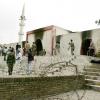Mumbai Terror Attacks: Agencies Yet to Learn Hard Lessons
For almost over sixty hours, Mumbai, the financial capital of India, witnessed a series of terrorist attacks, multiple hostage crisis, mindless killings, fierce gun battles and at the end, a disrupted life. The terrorists have struck major targets including luxury hotels and a Jewish Center frequented by Westerners and elite Indian only to be holed up later inside these buildings with innocent civilians as hostage. Their demand was the safe release of Mujahideen held in Indian prisons.








